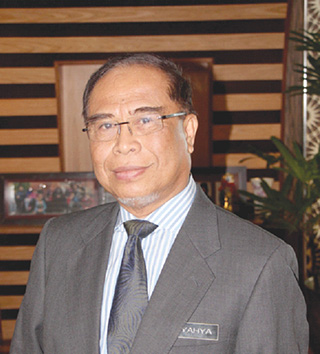Food security, RM4,000 monthly income
Published on: Friday, May 26, 2017

Kota Kinabalu: The State Government has launched its Third Sabah Agricultural Policy (SAP3) 2017-2026 that aims to increase food security and attain RM4,000 monthly income per household among farmers, fishermen and livestock breeders in Sabah.State Agriculture and Food Industry Minister Datuk Seri Yahya Hussin (pic) said the policy has set a target of achieving a minimum production growth rate of three per cent for self-Sufficiency Level (SSL) annually for food crops, livestock and fisheries products.He said the 10-year policy was formulated by the SAP Formulation Committee under his ministry over two years and approved by the State Cabinet on March 8 this year.
ADVERTISEMENT
"Incorporating both the national and state development agendas and various development initiatives of the country, SAP3 will sustainably establish a strong foundation for Sabah to further enhance the development and accelerate growth of its agricultural sector. "SAP3 was formulated with key emphasis on sustainable food production while increasing the household income to RM4,000 per month and some of the strategic directives in SAP2 are still relevant and have been incorporated in the SAP3."To drive the agricultural sector forward, it also aimed to strengthen productivity growth and competitiveness for nine 'Key Focus Agricultural Areas' and to ensure sustainability of food crops, fisheries ad aquaculture, livestock, industrial crops and other economic crops," said Yahya, who is also Deputy Chief Minister, when launching the SAP3 at Wisma Pertanian, Thursday.Also present were Deputy State Secretary Datuk Joseph P. Guntavid representing State Secretary Tan Sri Sukarti Wakiman, Sabah Industry Rubber Board (SRIB) Chairman Datuk Rubin Balang, Rural Development Corporation (KPD) Chairman Datuk Saddi Abdul Rahman, Safma's newly-appointed Chairman Datuk Ujang Sulani, the ministry's permanent secretary Ahmad Awang Hashim, heads of government departments and agencies.
ADVERTISEMENT
Yahya said SAP3 has also outlined nine "Key Focus Agricultural Areas" that will be focused on to enhance Sabah's food security level in vital sectors."The nine sectors are strengthening existing production of paddy and rice sector, improving sustainability of development in fisheries sector, increasing population growth of the ruminant sector by one per cent per year, to double existing production of fruits, vegetable and mushrooms sector, and increase production of all other economic crops.
ADVERTISEMENT
"It is also aimed to increase average palm oil yield from 21 tonnes to 25 tonnes per hectare per year by major plantation companies, strengthening the other industrial crops by intensifying the planting of and production of rubber, cocoa and pepper, increasing the export revenue generated from agro-based activities and to encourage development of agro-tourism industry," he said.To achieve the SAP3 three strategic goals, Yahya said the agriculture sector will use the Blue Ocean Strategy (BOS) with high-impact approaches, rapid implementation, low cost and sustainability.In addition, he said several enablers have been identified like infrastructures and facilities, utilisation of technologies and mechanisms, subsidies, assistance, management, regulations, research, human capital development, marketing, management value chain, management of natural resources, participation of private sectors and collaboration among agencies.As of now, Yahya said Sabah has sufficient supply of vegetables, fruits, poultry, fresh milk and fisheries with an upward trend in production to cater to local consumption and meet export markets.However, he said the State has yet to achieve its self-sufficiency level (SSL) for rice at 60 per cent which presently on average now stands at 30.82 per cent, during implementation of the SAP2.Stay up-to-date by following Daily Express’s Telegram channel.
Daily Express Malaysia




